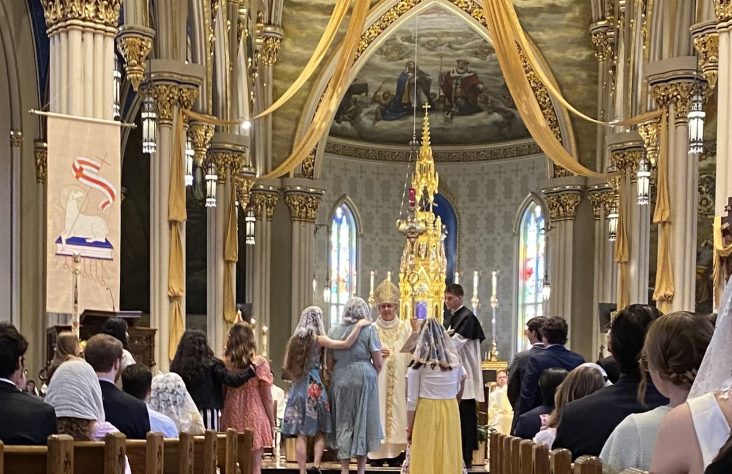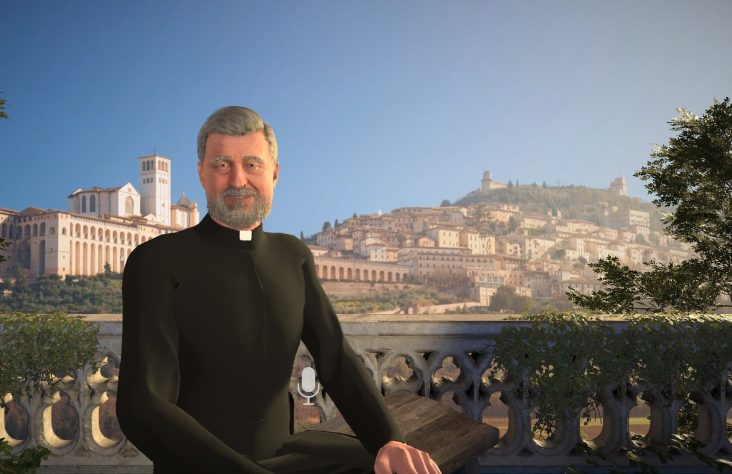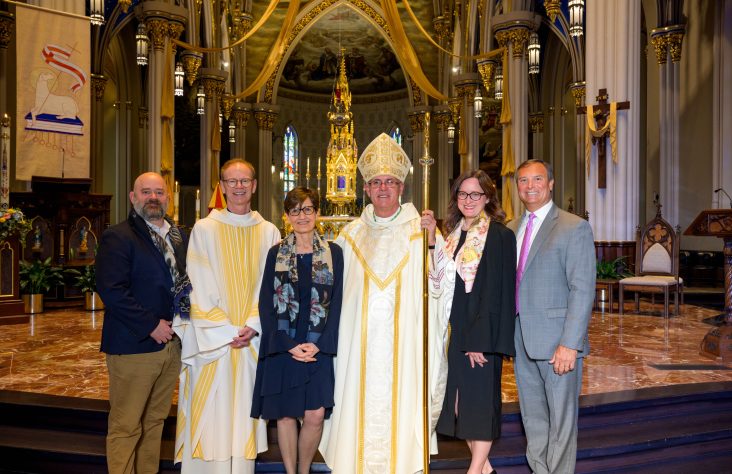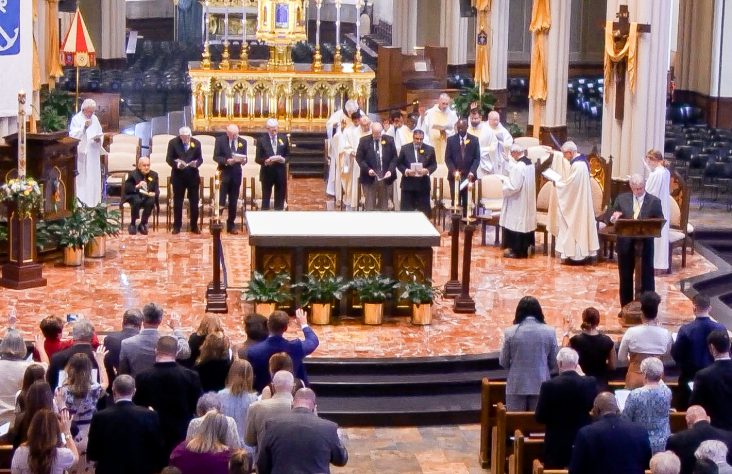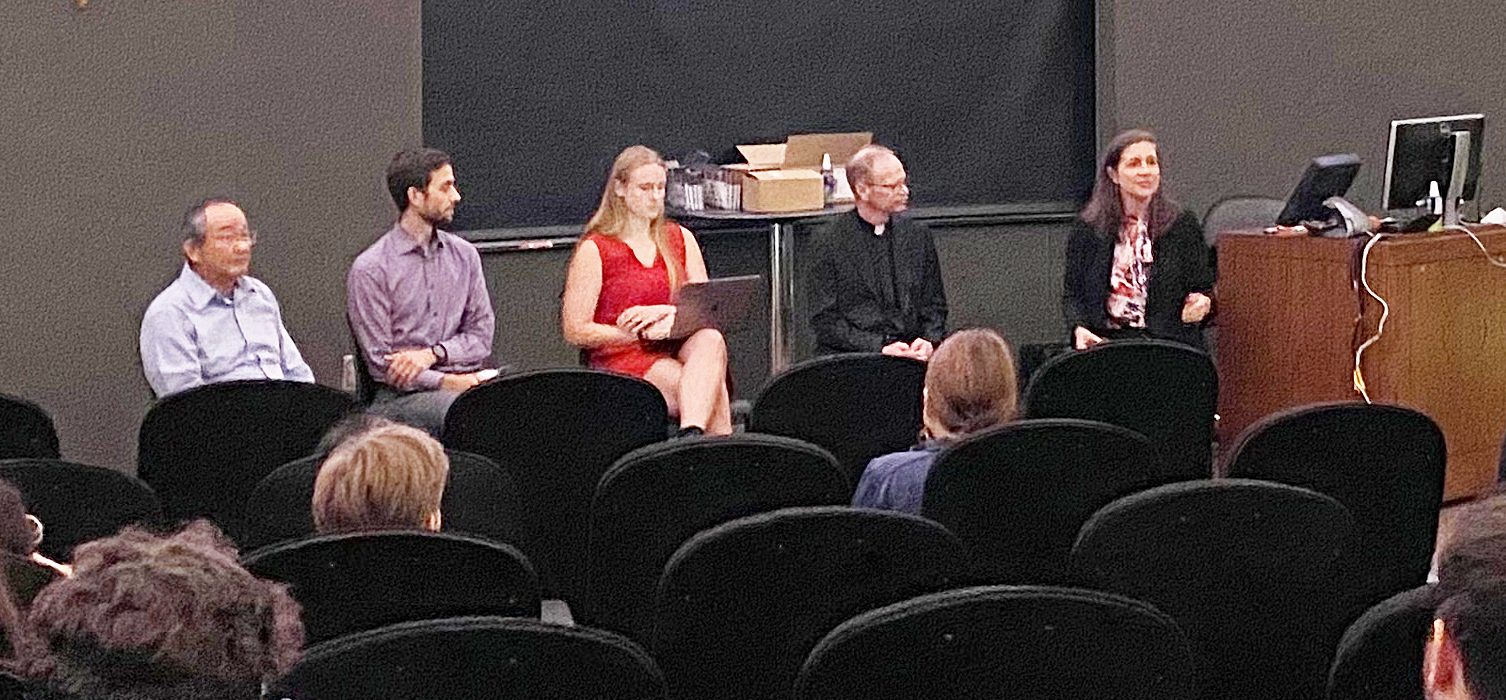October 20, 2023 // Diocese
Notre Dame Panelists Discuss Living Out ‘Laudate Deum’
On Wednesday, October 4, Pope Francis published a new apostolic exhortation, Laudate Deum (“Praise God”), on human ecology and our interconnectedness with the planet on which we live. The document is a follow-up to the pope’s 2015 encyclical Laudato Si’. A day after Laudate Deum was published, eight on-campus groups at the University of Notre Dame co-sponsored a panel discussion urging students and faculty to read the exhortation and take action.
The panel discussion on Thursday, October 5, was preceded by a showing of “Let There Be Light,” a short planetarium program commissioned by the Vatican, and a joint production of Notre Dame’s Digital Visualization Theater and the McGrath Institute for Church Life. The video presentation addressed concerns brought up in both Laudate Deum and Laudato Si’, such as the climate crisis and its impact on populations around the globe.
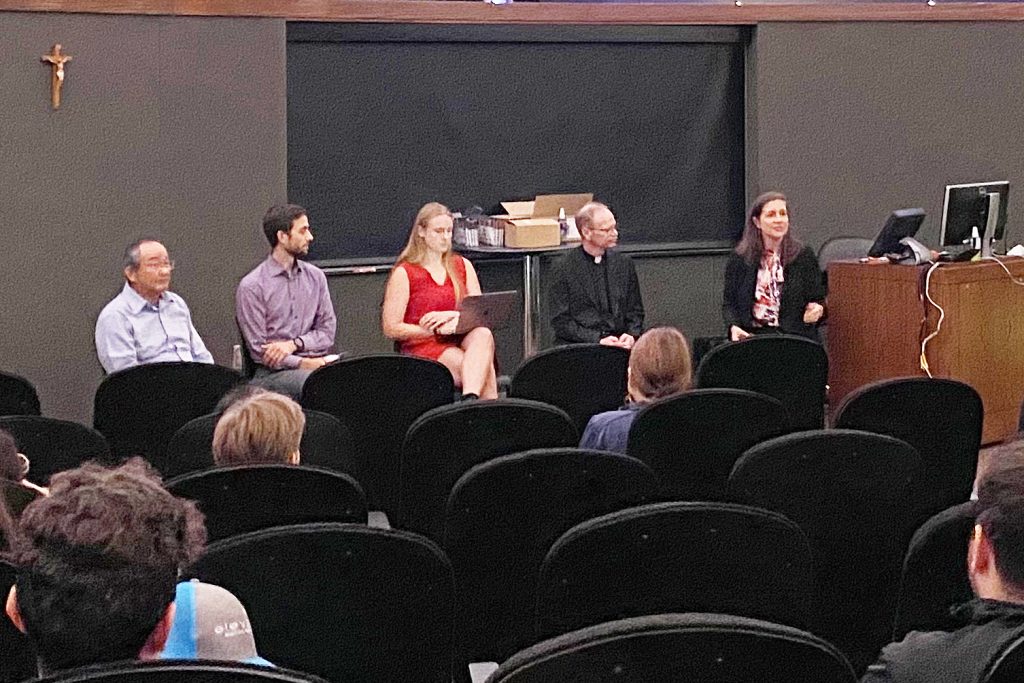
Michelle McDaniel
Members of the University of Notre Dame community speak during a panel discussion on Pope Francis’ recent apostolic exhortation on human ecology, Laudate Deum, at the school’s Digital Visualization Theater on Thursday, October 5.
With Pope Francis and Vatican officials acknowledging the relationship between Laudate Deum and Laudato Si’, the first official papal document centered solely on the pressing issue of ecology, which made international headlines following its release in 2015, the first question asked of the panel at Notre Dame related to the connection between the two documents. Of the four panelists – each with a different scholarly focus and expertise – this question was answered by Tyler Popa, a third-year student in the school’s Master of Divinity program. Popa said the two pieces should be read in tandem with each other.
“Pope Francis’ vision in 2015 of Laudato Si’ was specifically about how to care about our common home,” Popa said. “It’s very comprehensive. There’s a lot to it. [Laudate Deum] is a way to continue the conversation. Not enough has been done, so he’s re-addressing his concerns,” Popa said.
Next, the panel’s moderator and Senior Director of the Office of Sustainability, Geory Kurtzhals, addressed the contradiction between the two things Pope Francis asks of readers: contemplation and action. This point was addressed by Holy Cross Father Robert Dowd, who is the Vice President and Associate Provost for Interdisciplinary Initiatives, as well as an Associate Professor of Political Science at the university. Father Dowd urged those in attendance to remember who they are in relation to nature.
“Pope Francis is reinforcing the urgency of the ‘now’ in this exhortation,” Father Dowd said. “It’s the call to stop our very fast-paced lives and reflect on or contemplate our place in the world and remember who we are.”
“At the core of this crisis we face, it’s a spiritual issue, because we’ve forgotten our place in creation,” Father Dowd continued. “We’ve made ourselves masters of creation. We’ve attempted to dominate creation. And we’ve done this to the detriment of ourselves and creation.”
Father Dowd did not stop at the problem but also described how to find the solution: remembering one’s place within creation.
“People feel like they can’t do much as individuals, so why act?” Father Dowd asked. “Or they think it’s too late, so why does it matter anyway? Pope Francis calls us to remember who we are and grow in appreciation for how much we depend on each other and how much we depend on nature.”
Popa later added to these thoughts, pointing out that religious practices such as attending Mass are rejections of the fast-paced and consumptive lifestyles that lead to environmental issues. According to Popa, these religious practices change the disposition of Catholics, helping them to naturally grow in respect for the world around them without expectations for the conveniences contributing to climate change.
Another panelist, Phil Sakimoto, Director of the Sustainability Minor and Professor of the Practice in the school’s Department of Physics and Astronomy, discussed one of the major differences between Laudate Deum and Laudato Si’: Pope Francis’ newfound use of scientific evidence to support his claims regarding climate change.
“We witness the extreme weather, the heat, the droughts, the catastrophic floods, and so forth, and he puts data in here, which he didn’t do before. He’s consulted with scientists,” said Sakimoto, who argued that, in this new exhortation, Pope Francis does more than implore readers to act; he rebuts common objections to climate change, directly refuting people who he believes downplay or deny the severity of the threat posed by climate change.
As moderator, Kurtzhals asked Lizzie Stifel, the student government’s Director of Sustainability, how this new papal document affects younger generations. As a university student herself, Stifel offered a perspective from a young adult on the importance of changing habits as soon as possible, as well as convincing others to do the same.
“We’re going into the workforce. We’re going to have families. We can bring those changes with us,” Stifel said. “We’ve got to take the time to dedicate ourselves to learning so that we can turn that learning into action. We are responsible for one another and for making those small and great changes.”
Finally, Father Dowd answered the question of how everyone can respond to Pope Francis’ call within Laudato Deum. According to Father Dowd, one of the biggest dangers the world faces is complacency.
“Laudato Deum calls us and challenges us to be more ambitious, to do everything we possibly can to reduce wasteful consumption,” Father Dowd said.
One of the organizers of the event, Margaret Pfeil, a Professor in the Department of Theology, said she hopes people will take heed of Pope Francis’ call after this panel discussion.
“Pope Francis says that there is no cultural change without personal conversion and a change of habits,” Pfeil said. “I think, especially within Notre Dame and the Diocese of Fort Wayne-South Bend, there are so many opportunities to take action around ecological conversion as a matter of our faith commitment. That has to start with each one of us, but we also have to support each other in that process.”
The urgency for cultural transformation influenced Pfeil’s participation in the planning of this event, she said.
“I think if we cultivate the habit of contemplative awareness and encountering God’s love in God’s creation, it won’t be so hard to change, because it’s written in love,” Pfeil said. “It’s not something we have to do out of moral obligation, but something we feel compelled to do because we love God’s creation as God loves it.”
The best news. Delivered to your inbox.
Subscribe to our mailing list today.

